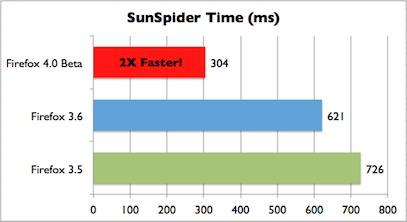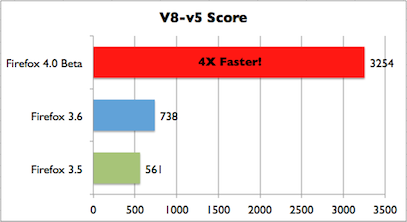Firefox just got a whole lot faster.
I’m excited to announce that Mozilla’s new JavaScript engine, JägerMonkey, is now available for testing!
What is JägerMonkey?
JägerMonkey is our new optimizing JIT compiler for JavaScript. It sits underneath our existing JIT, TraceMonkey, which appeared in Firefox 3.5. If you recall from previous posts, TraceMonkey’s job is to optimize loops to very fast machine code. However, not all code has loops, and not all loops can be trace compiled.
JägerMonkey is a general-purpose compiler which converts entire methods to machine code. The goal is to get great baseline performance. When it detects a loop that can be traced, it automatically engages the trace compiler, which makes it even faster. Yes, that’s right: there’s a turbo button inside.
This hybrid approach is designed to use well-established optimization techniques that work everywhere, and combine them with our existing hyper-optimizing engine that handles smaller subsets of code.
Results.
If you’ve been obsessing over Are We Fast Yet? like me, you’ve seen the numbers dive. Want to try it out? Click here to get preview builds of Firefox 4 with our new JavaScript engine. You can play demos like JSNES at a full, glorious 60FPS.
Disclaimer: It’s a preview – we’re still ironing out the rare kinks. Please report bugs or tell us if something’s wrong (or slow!)
Benchmarks.
We’ve been using the SunSpider 0.9.1 and V8-v5 benchmarks to gauge our general progress. SunSpider is a full 2X faster over Firefox 3.6!
Our improvement on the V8-v5 benchmark is even more dramatic – 4X!
Ongoing Work.
The rockin’ doesn’t stop here. Right now we’re polishing off the final pieces to get into the next Firefox 4.0 Beta. At the same time, here are some of the immediate performance works-in-progress:
- Function Calls. As discussed previously, this is one of our last big areas of optimization. The first of four major pieces, caching call sequences, was completed this week. The second big chunk, which Luke Wagner has slated for this week, will make arguments and stack frames faster. Brian Hackett, Chris Leary, and Bill McCloskey have more stack frame optimizations as part of the third wave.
- Tracer Integration. Deciding when to use the turbo button is pretty hard, but Bill and Dave have been researching it thoroughly. Right now we’re just scratching the surface, and we will have much better heuristics by the end of the month.
- Web Optimizations. Community member Jan de Mooij is continually finding demos and real-world tools and improving performance “gotchas” in our engine, like making common arithmetic patterns faster.
Conclusions.
Firefox 4 is seeing dramatic wins over 3.6 and the web is feeling faster. You can try it out now using a JS Engine Preview, or wait for Firefox 4 Beta 6.
Please stay tuned as we approach JägerMonkey end-game for Firefox 4. Dave Mandelin and I will be blogging, and for smaller things, tweeting (his here) progress & technical updates.

